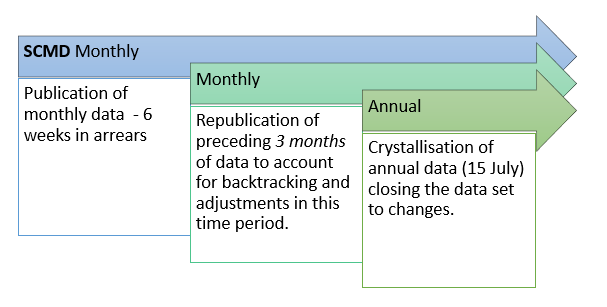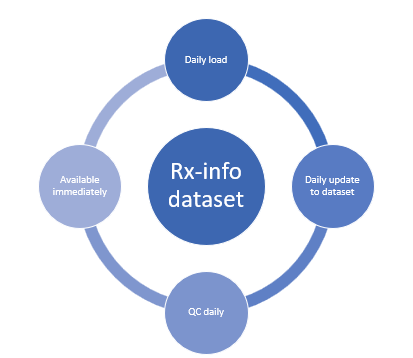What is the difference between SCMD data and Rx-info data?
Posted in Announcement, News, Publications
With growing interest in the NHSBSA publication of the Secondary Care Medicines Data feed (SCMD) including the analytics by GPRx, OpenPrescribing and others, there are more questions about what differences there are between the open source SCMD and the data used by Rx-info systems within the NHS.
As we know them both in depth (as we collate both sets😇), here is a useful, expert reference guide!
Secondary Care Medicines Data Feed (SCMD)
What is the difference between SCMD data and Rx-info data?
-
The SCMD data:
- is published 6 weeks in arrears whereas the Rx info data is published daily.
- shows data from 2 months ago and back, the Rx-info data can show activity up to the preceding day.
- is aggregated to Monthly data, the Rx-info data can show daily transaction level activity (to date time and second).
- shows the Generic product (Generic name, drug form and dose), the Rx-info data will show the brand when known (66% of all the data)
- will show an indicative price (BNF price rather than that paid) for the drug, Rx info will show the actual price paid including or excluding VAT as applicable to the supply route.
| SCMD | Rx-info | |
| Publication Delay | 6 weeks in arrears | 1 day |
| Most recent data | End of month, 2 months in arrears | 1 day |
| Aggregation level | Month blocks | Daily |
| Granularity | Generic – VMP level only | Brand – AMP level (>66% of dataset) |
| Pricing | Indicative | Actual (inc / exc VAT) |
When is the SCMD Data updated?
Rx-info provides a feed of data from the NHS facing Rx-info Define benchmarking system to the NHSBSA SCMD data repository each month. The data is supplied 6 weeks in arrears to allow for adjustments to be made at the hospitals and to align the date period with the existing Primary Care ePACT data.
The data is therefore a snapshot in time of the date when reported to the NHSBSA and does not take into account any alterations after the publish. However, each month the previous 3 months of data are republished to SCMD to reconcile any changes that have happened in that time period.
Each July, the previous full financial year is “crystalised” i.e. – the data is fixed in time and should account for the majority of alterations from organisations. This will mean that known gaps in the data that are still being addressed by the Trusts will not reflect in this fixed data set. The NHS facing data will update as soon as the new data is captured (usually daily).

Why might the data in the NHSBSA source vary from the NHS Rx-info system?
It is important to understand that the data in the secondary care sector is fluid and there are regular historical changes to the data with adjustments made, as issues are identified within each hospital Trust.
Any adjustments to the pharmacy systems are captured on a daily basis within the NHS facing Rx-info Define dataset to constantly reflect accurately the pharmacy systems within the country.
Data from smaller Health Trusts (Community and Mental Health) is captured after the month end, usually when the medicines provider is a third-party e.g. Homecare or Boots. There may be some delays in the capture of this data in the Rx info system depending upon the SLA in place between the third-party and the Trust. Ideally this is within the 6-week window, but if there are delays, then some of the smaller third-party supplier information may be missing from the NHSBSA feed until the next monthly update or annual crystallisation.

Why might there be gaps in the data?
When Trusts change their pharmacy system, there can be a delay in the recapture of information from the new data source, whilst connections and validation are established.
As soon as the data is flowing and the historical data is captured within the NHS facing Rx-info system, then it will be available for the NHSBSA at the next update.
There are many Trusts across the UK and there are always upgrades/new system/updates happening somewhere across the NHS, and it is unfeasible to refresh the data every time there is a change to the data (daily).
Why might the data change?
When Trusts merge together, there is a delay in publishing the new aggregate data for the new single organisation, until legal recognition of the new Trust is published by NHS Digital. (https://digital.nhs.uk/services/organisation-data-service/news-and-alerts/mergers-and-acquisitions)
Data in the NHS Rx info system will continue to report the individual Trusts until the Trusts are officially merged together. At this point the data is retrospectively applied, and the data removed from the system for the Trust that ceased to exist and the data is aggregated with the acquiring organisation from the official date of the merge. This may happen at any time and impact upon the “snap shot” of data reported to NHSBSA, rather than the fluid Rx info NHS data which will update immediately.
The annual crystallisation of the data usually captures this case.
Is the data complete?
Rx info captures all forms of prescribing from all (100%) of the Secondary Care organisations. This includes the activity processed through a Trust’s own Pharmacy system, the Outpatient activity, often reported through a third-party, Homecare data, prison data, specialist supplier data and any other sources of prescribing that attract a cost to the Trust.
If a data source is identified by a Trust as missing from their dataset, then Rx-info will work with the Trust to identify the data, and capture this retrospectively from the point of inception or April 2011 (which ever date is more recent).
The data within Rx-info therefore is fully comprehensive covering, Inpatient, Outpatient, Ward stock issues, Homecare, Take Home meds, Over-labelled, Clinical Trials, Free stock.
I think I have found an error in the SCMD, what should I do?
Trust data may contain errors / accurate reflections of what was entered in the Trust pharmacy system, but clearly needs to be adjusted.
These anomalies are identified and highlighted by Rx-info QC processes to each Trust, but may take 4-6 weeks at least for the Trust to fix/update. In the meantime the current data may be uploaded to SCMD. Due to the SCMD refresh rate it may take the annual crystallisation process for these anomalies to be amended in the SCMD refresh.
If you identify any potential errors, then please raise these via the NHSBSA support links on the SCMD webpage https://www.nhsbsa.nhs.uk/secondary-care-medicines-dataset-scmd-now-available-epact2